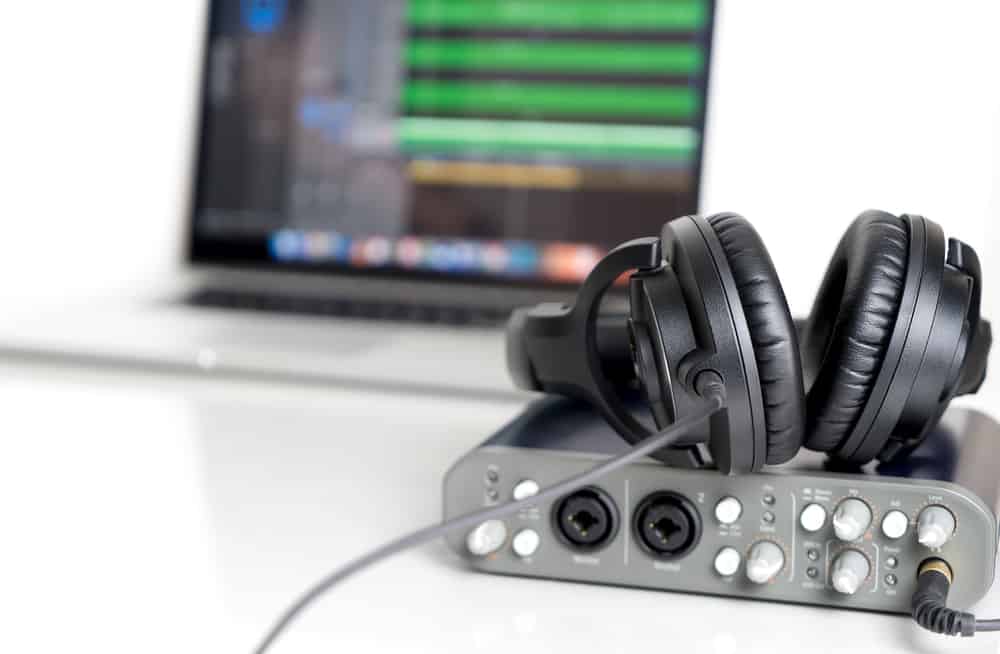Even if you are familiar with the musical world and the processes involved in making music, mastering might still be a mystery to you.
Every good song – regardless of where you hear it – has been mastered on some level. Mastering is a critical aspect of audio post-production, and it is critical that every recording artist and producer know what it is.
Audio mastering is the process of making fine tweaks and alterations to recorded music by balancing frequencies and adjusting levels to sound as good as it should. Mixing balances tracks, but mastering polishes them. Everything good about a song is revealed through the process of mastering.
There are several ways to master a song. Different people have varying definitions of what refined mastering is.
Still, there is no doubt that every track needs to be mastered before it is released. Let’s take a deeper look at mastering to understand what it is and why it is necessary.
What Is Audio Mastering?
Everyone musician and producer finds themselves asking this question at the beginning of their career. Everyone knows what an audio mix is, but not everyone really understands what audio mastering is and why it is so important. So, what is audio mastering?

Audio mastering is the final step in audio post-production. It is the process of getting individual songs to sound as good as possible and making complete albums sound as coherent and cohesive as possible before the music is released.
Mastering starts with a song or album that is already fully recorded and fully mixed. The goal of mastering is to make the song sound even better.
Mastering also ensures that the music sounds good across all devices and platforms. After mastering, everything in the song sounds as professional and high-quality as possible.
The process of mastering is complex and challenging, and it requires significant time and skill to do it well. Regardless of the difficulty, the process is necessary, since a well-mastered song sounds worlds better than a song that is simply mixed.
A mixed song sounds fine, and everything is present in it, but the process of mastering brings the song to another level and highlights everything good about it.
Mastering is a critical process that every song must go through to sound its best.
What Is Mastering Vs. Mixing?
The music industry is full of confusing terms, but there are no two terms that are confused more often than mixing and mastering. The reality is that there is a drastic difference between these two processes, and it is critical to understand this distinction before releasing any music.

The process of mixing a track or an album is the process of mixing the sound levels and effects of each individual audio track that makes up a song. Mixing ensures that the volumes, gain stages, effects, and frequencies of each track sound good together when they are played together.
This process makes sure that there are no clashing frequencies or effects, that nothing is clipping or popping, and that nothing is too loud. Mixing removes everything unpleasant from a song and brings every aspect of the track onto an even par in order to master it well.
Mastering is very different from mixing. This process does not work with individual tracks that make up a song, but it works with the song itself to make it sound as good as possible.
When a song is mixed, all of the tracks in the song are at a good, balanced level. Everything that should not be in the song has been removed – but no steps have yet been taken to make the song sound better.

This is where mastering comes in.
Once a song has been mixed, mastering the track brings out all of the interesting elements, frequencies, and characteristics that make the song truly great.
A purely mixed song will sound flat and dull, but a mastered song will sound lively and vibrant. Every great thing about the song is brought to the surface to create a well-balanced, great-sounding track that highlights all the work that went into making it.
A mixed song does not sound good on all listening platforms or devices, since there are some frequencies that will not sound through on certain platforms.
Mastering ensures that everyone who listens to the song (regardless of where they listen to it or on what devices they play it) hears a version that is clearly audible with high quality.
Is Audio Mastering Important?
We have learned that there is a significant difference between mastering and mixing – but is mastering really that important? Is mixing a track not enough?

In some instances, mixing the audio can be enough (for example: demo tracks, guide tracks, or tracks that are simply recorded as an idea rather than as a fully-fledged song). If the audio will not be released to the public, then it does not always need to be mastered, as this process is challenging and can be very expensive.
However, mastering is critical for any song that will be released publicly. In fact, some streaming platforms will not even showcase or distribute a song that is not well mastered.
Mastering brings a song from a raw mix into something wonderful. The process changes the song from some basic audio tracks into one cohesive, good-sounding song that allows the listener to really enjoy the music.

Mastering is very important – without it, no song would sound good.
Mixing tracks is critical, and it does require significant skill, but a song or an album is not ready for launch if it has not been mastered.
Mastering makes songs sound better, and it makes albums sound finished. If you listen to an unmastered album, it sounds weak and lifeless, and none of the songs flow well into one another. A well-mastered album sounds complete and vibrant, and it sounds the way you expect a well-made album to sound.
No song or album is complete without mastering.
Can You Master Your Own Tracks?
Mastering is an exceedingly important aspect of producing music. Many artists and musicians wonder if they can master their own tracks or if they need to hire someone else to do it.

The reality of the music industry is that the most important jobs require the most money. Professional mastering engineers charge a lot to perform mastering, and they are right to do so because their efforts determine the way the song turns out, which in turn, determines how well the song performs.
However, not everyone has the budget or the time to use a dedicated mastering engineer.
You can master your own tracks if you have the equipment and software, but be warned that the process is challenging, it can be frustrating, and it will require a lot of time and effort.
Anyone who has a high-quality DAW can master their own tracks.
All you need is to export the mixed audio as a single file and master it by making tweaks and changes to the audio as you listen to it. Take a free online course on mastering, watch some videos on how to do it well, and take the plunge into mastering your own tracks.

This process will take a long time to perfect, and you will probably have to re-master your songs several times before they sound as good as you want them to, but you can do it yourself.
Take the time to acquire the skills that you need for the mastering process, and then take your time during the mastering process. The great thing about mastering your own music is that you can take your time with it, and you can get it to sound exactly how you want it to.
Mastering can completely change the sound and feel of a song, so mastering it yourself ensures that the track will come out exactly the way you imagined. This is a great benefit of mastering your own music, and learning the skill is a great asset to any producer.
If you get good enough at mastering, you might be able to help other artists and producers who need the service, thus expanding your network (or earning some extra cash on side projects).
How To Know When A Track Is Ready To Be Mastered
Another important question asked by many new artists and producers is how you know when a song is ready to be mastered. How can you tell when a song has been mixed thoroughly enough and is now ready to go through the mastering process?
The answer here is entirely subjective. Everyone has their own opinion regarding when a song is finished being mixed and is ready for mastering, and the reality is that you need to make this call for yourself for each individual track.
Every song will require different levels of mixing, and the mastering process needs to be different for every song as well. This means that the point at which a song is ready for mastering is different for every track.
However, there are some basic production guidelines that you can use to determine when a song is ready for mastering.
A song is ready to be mastered when you are happy with the mix; the key here is to remember that mixing does not produce a good-sounding song, but it produces a balanced, well-crafted mix that can then be mastered into a great-sounding song.
If you have gone through the process of mixing your audio, and everything is at a point where you feel there is no mixing left to be done, then the song is ready for mastering.
If you listen to the track and find that there are still things that you want to change regarding mixing, effects, panning, EQ, and compression, then the audio is not ready for mastering.
Remember that if you begin the mastering process and find that the audio is not, in fact, ready to be mastered, all of the mastering that you have completed will need to be scrapped, and you will need to begin mastering the song again once you have made the mixing changes.
This means that you must be entirely sure that a song is ready for mastering before you finish the mixing process, or you will just be doing more work for yourself (or you will have to spend significantly more money on mastering than necessary).
Does Mastering Really Make A Difference?
Audio mastering is an essential process, but even though it is so important, some people still struggle to see its importance. Many artists find themselves wondering how important mastering is, especially if they have heard someone do a very good mix.

Regardless of how good your mix is and how skilled you are at getting a good mix, a song or an album will never sound as good as it should without mastering. A lack of mastering can even cost you significant money in the music industry.
The reality is that mastering is the process of getting music up to the standard that is expected by the music industry and the people who listen to the music.
If your songs are not well-mastered, they will be perceived as lower quality, and many streaming platforms will not approve them. If your songs do not make it onto streaming platforms, they often will not do well.
If your songs are not mastered, they will not sound as good as other songs in the same genre, even if they are mixed very well. Even worse: anyone who finds the music will immediately write it off as bad, since they have heard other (mastered) songs that sound far better.
If your audience does not like the way your songs sound, they will not listen to them, and your music will go nowhere.
If you care about your music and making any kind of impact in the music industry, or even if you want to make some money producing music, your tracks need to be mastered well to do so.
Conclusion
Mastering is as important as every other aspect of the music production process. In some instances, mastering is the most important process that a song can go through.
Taking the time to master a song well will mean the difference between the song performing well and the song being poorly received.
A good song must be well-mastered, or it will not do well. Without mastering, a song will never sound as good as it should, even with a good mix. Take the time to master your music well, and it will perform much better.
If you are doing your own mixing and mastering, you can learn which mixers have the best effects here.
You can learn all about modulation effects here.
You can learn about spectral effects here.
